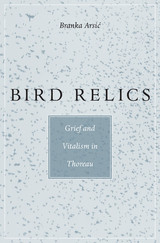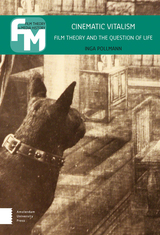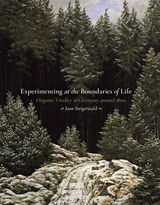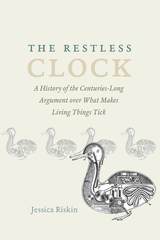
Birds were never far from Thoreau’s mind. They wing their way through his writing just as they did through his cabin on Walden Pond, summoned or dismissed at whim by his whistles. Emblematic of life, death, and nature’s endless capacity for renewal, birds offer passage into the loftiest currents of Thoreau’s thought. What Branka Arsić finds there is a theory of vitalism that Thoreau developed in response to his brother’s death. Through grieving, Thoreau came to see life as a generative force into which everything dissolves. Death is not an annulment of life but the means of its transformation and reemergence.
Bird Relics traces Thoreau’s evolving thoughts through his investigation of Greek philosophy and the influence of a group of Harvard vitalists who resisted the ideas of the naturalist Louis Agassiz. It takes into account materials often overlooked by critics: his Indian Notebooks and unpublished bird notebooks; his calendars that rewrite how we tell time; his charts of falling leaves, through which he develops a complex theory of decay; and his obsession with vegetal pathology, which inspires a novel understanding of the relationship between disease and health.
Arsić’s radical reinterpretation of Thoreau’s life philosophy gives new meaning to some of his more idiosyncratic habits, such as writing obituaries for people he did not know and frequenting estate sales, and raises important questions about the ethics of Thoreau’s practice of appropriating the losses of others as if they were his own.



In the first comprehensive English-language introduction to Deleuze, John Marks offers a lucid reading of a complex, abstract and often perplexing body of work. Marks examines Deleuze’s philosophical writings – as well as the political and aesthetic preoccupations which underpinned his thinking – and provides a rigorous and illuminating reading of Deleuze’s early studies of Hume, Nietzsche, Kant, Bergson and Spinoza, his collaborations with Felix Guattari, and the development of a distinctively ‘Deleuzian’ conceptual framework. Marks focuses on the philosophical friendship that developed between Deleuze and Foucault and considers the full range of Deleuze’s fascinating writings on literature, art and cinema. This is a clear and concise guide to the work of one of the twentieth century’s most influential thinkers.

The Restless Clock examines the history of this principle, banning agency, in the life sciences. It also tells the story of dissenters embracing the opposite idea: that agency is essential to nature. The story begins with the automata of early modern Europe, as models for the new science of living things, and traces questions of science and agency through Descartes, Leibniz, Lamarck, and Darwin, among many others. Mechanist science, Jessica Riskin shows, had an associated theology: the argument from design, which found evidence for a designer in the mechanisms of nature. Rejecting such appeals to a supernatural God, the dissenters sought to naturalize agency rather than outsourcing it to a “divine engineer.” Their model cast living things not as passive but as active, self-making machines.
The conflict between passive- and active-mechanist approaches maintains a subterranean life in current science, shaping debates in fields such as evolutionary biology, cognitive science, and artificial intelligence. This history promises not only to inform such debates, but also our sense of the possibilities for what it means to engage in science—and even what it means to be alive.
READERS
Browse our collection.
PUBLISHERS
See BiblioVault's publisher services.
STUDENT SERVICES
Files for college accessibility offices.
UChicago Accessibility Resources
home | accessibility | search | about | contact us
BiblioVault ® 2001 - 2024
The University of Chicago Press









